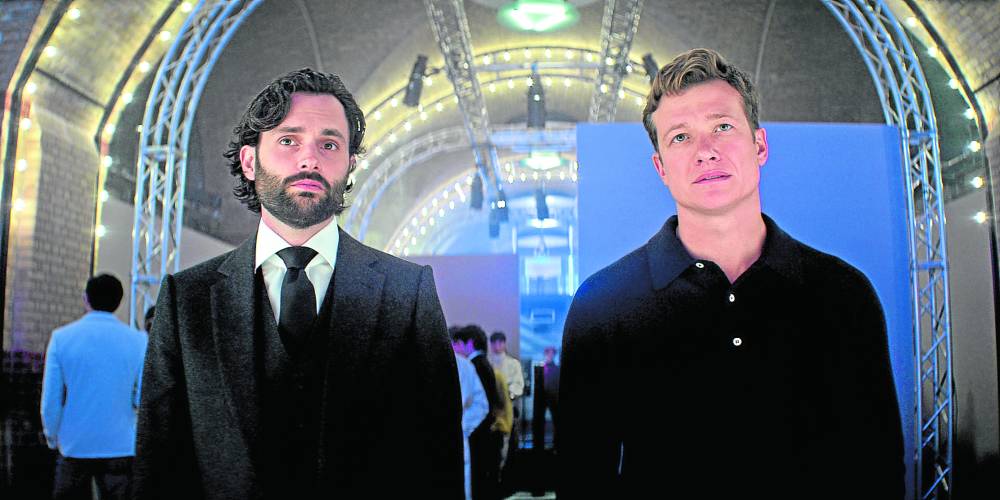Why Penn Badgley had to embrace serial killer role in latest season of ‘You’
Given the chilling premise of Netflix’s navel-gazing stalker series “You,” it’s easy to see the voyeuristic lure of seeing protagonist Joe Goldberg (Penn Badgley) chase after love and all-encompassing control, regardless of the dire repercussions of his remorseless actions.
After his gory—and deadly—romantic misadventures in New York (Season 1), Los Angeles (Season 2) and San Francisco (Season 3), Joe manages to inexplicably reinvent himself in Season 4 as a literature professor named Jonathan Moore, but this time, in the swanky echelons of London’s high society.
Playing out like a whodunit, the latest season finds Joe navigating a dangerous new playground swarming with beautiful, filthy rich but unapologetically wild and snooty playmates who are as morally bankrupt as the mysterious expat himself. (Part 1 launches today; Part 2, on March 9)
While Penn is appreciative of the series’ enduring popularity among Netflix viewers, he has never “romanticized” Joe’s nihilism and psychopathic outbursts. After all, Joe’s actions aren’t misdemeanors you can merely ignore.
When we spoke to the dashing actor about “You’s” sophomore season in December 2019, the 36-year-old former “Gossip Girl” regular aptly noted, “Everything I’ve ever gotten from the Philippines since this show came out has only been positive, and your support means a lot! But I don’t know how a show like ‘You’ can brighten up your Christmas (laughs)!”
Unreliable narrator
Well, we told Penn that the production has always been a deliriously dark delight to watch—and we weren’t just saying that to stroke his ego. Season 3, in fact, boasts a 93-percent approval rating on Rotten Tomatoes.
Putting matters in perspective, Penn mused, “I think what actors say about not judging their characters is a bunch of nonsense. If you can’t judge a character’s actions between ‘action’ and ‘cut,’ then you’re dead. If you ask me if there’s any need for me to justify Joe’s morality to defend his decisions, I would have to say no. That would be morally irresponsible.”
When we spoke to Penn in a quick one-on-one interview last Monday, we asked him a follow-up question to the issue discussed above: What does he think is the reason behind the show’s enduring popularity despite the lead character being far from anybody’s idea of a role model?
“Look, the question you just asked does get you thinking,” answered Penn. “But I think this show is just like any series that works—it uses high drama and camp at times, as well as comedy and violence … it’s all those things.
“It’s playing with these neon colors to bring home fleeting moments of poignancy and beauty that really make viewers think and feel. That’s what stories are for. And honestly, the series is mostly not unique in the sense that it’s using all those elements to make it work.
“It’s also because the show is mostly anchored on one guy’s perspective. And that person is this deliciously unreliable narrator, Joe, who happens to be very intelligent and perceptive. He’s able to check all the boxes and make you feel comfortable in a way.
Redemption
“Joe represents a lot of the tropes we’ve seen in terms of having an Everyman or a nice guy-next-door at the center of a story. But then, the production turns that on its head and makes him a total maniac. Yes, we’ve seen something similar before, but we’ve never been able to ‘experience’ it with so much [firsthand] clarity … like a voiceover in your mind. And I think that’s what makes it cool.”
Given Joe’s track record as a prolific serial killer, we asked Penn if he would agree with what aspiring politician Rhys Montrose (Ed Speleers) said about second chances in Episode 1 (“I believe in redemption, as long as you don’t run away from yourself”). Does everybody, including Joe, deserve a shot at redemption?
Penn replied, “People often use the word redemption historically—it’s biblical, it’s religious, it’s spiritual. It’s a really big word. And, to be honest, the second you bring in that word in terms of having one person decide whether or not anyone is worthy of redemption, that’s a God-level decision to make (laughs), you know? How can one individual make that decision for another? Is it fair?
“Joe isn’t real. And in a world without Joe, I think redemption is a thing. So, theoretically, it’s possible for those who have done something really terrible to seek and find redemption, although the bar for them is just too high. But if you ask me if redemption is possible for Joe, no.”
Ironically, while Penn, the actor, has avoided “justifying or defending” Joe’s actions, Penn, the director/producer, disclosed to us that he had found it easier to be “in Joe’s corner” when it was his turn to helm the season’s must-see penultimate episode (Episode 9).
What did Penn find challenging and satisfying about sitting in the director’s chair and acting at the same time?
Natural progression
“Not being able to be in two places at once was ridiculous, but going from actor to director felt like natural progression,” he reasoned. “Frankly, I enjoyed playing Joe more than ever when I was directing that episode. It all came quite naturally because, by then, Joe was already such a technical role for me.
“The downside was, I had no life while I was directing and starring in it. I wasn’t sleeping much, and it was just a lot of work—that’s really what it came down to. That was my only hesitation … that I couldn’t be in two places at the same time, which was sort of a problem as we were doing it. So hurdling that challenge felt like a logistical feat.
“You know, the way that I’ve spoken about Joe, I’ve always been clear about how hard it sometimes was to portray him as a character. As an actor, I resisted [the premise of] the show in ways that I resisted Joe as a character. So, I wasn’t really sure how it would go.
“But as director, I didn’t want to resist Joe and the show itself. I had to embrace everything about him in order to steer the ship in a decisive way.”

